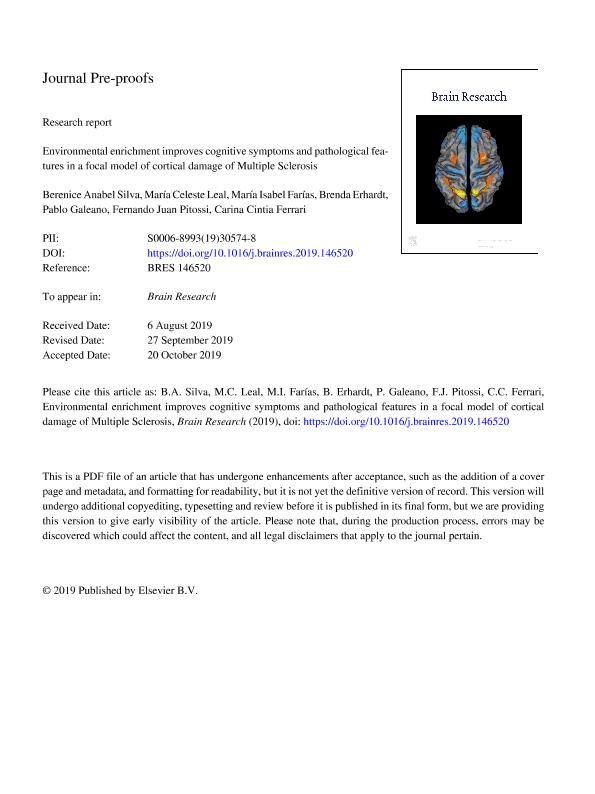Artículo
Environmental enrichment improves cognitive symptoms and pathological features in a focal model of cortical damage of multiple sclerosis
Silva, Berenice Anabel; Leal, Maria Celeste ; Farias, Maria Isabel
; Farias, Maria Isabel ; Erhardt, Brenda
; Erhardt, Brenda ; Galeano, Pablo
; Galeano, Pablo ; Pitossi, Fernando Juan
; Pitossi, Fernando Juan ; Ferrari, Carina Cintia
; Ferrari, Carina Cintia
 ; Farias, Maria Isabel
; Farias, Maria Isabel ; Erhardt, Brenda
; Erhardt, Brenda ; Galeano, Pablo
; Galeano, Pablo ; Pitossi, Fernando Juan
; Pitossi, Fernando Juan ; Ferrari, Carina Cintia
; Ferrari, Carina Cintia
Fecha de publicación:
01/2020
Editorial:
Elsevier Science
Revista:
Brain Research
ISSN:
0006-8993
Idioma:
Inglés
Tipo de recurso:
Artículo publicado
Clasificación temática:
Resumen
Multiple Sclerosis (MS) is a neuroinflammatory disease affecting white and grey matter, it is characterized by demyelination, axonal degeneration along with loss of motor, sensitive and cognitive functions. MS is a heterogeneous disease that displays different clinical courses: relapsing/remitting MS (RRMS), and MS progressive forms: primary progressive (PPMS) and secondary progressive (SPMS). Cortical damage in the progressive MS forms has considerable clinical relevance due to its association with cognitive impairment and disability progression in patients. One treatment is available for the progressive forms of the disease, but none are specific for cognitive deficits. We developed an animal model that reflects most of the characteristics of the cortical damage, such as cortical neuroinflammation, demyelination, neurodegeneration and meningeal inflammation, which was associated with cognitive impairment. Cognitive rehabilitation, exercise and social support have begun to be evaluated in patients and animal models of neurodegenerative diseases. Environmental enrichment (EE) provides exercise as well as cognitive and social stimulation. EE has been demonstrated to exert positive effects on cognitive domains, such as learning and memory, and improving anxiety-like symptoms. We proposed to study the effect of EE on peripherally stimulated cortical lesion induced by the long term expression of interleukin IL-1β (IL-1β) in adult rats. Here, we demonstrated that EE: 1) reduces the peripheral inflammatory response to the stimulus, 2) ameliorates cognitive deficits and anxiety-like symptoms, 3) modulates neurodegeneration, demyelination and glial activation, 4) regulates neuroinflammation by reducing the expression of pro-inflammatory cytokines and enhancing the expression of anti-inflammatory ones. Our findings correlate with the fact that EE housing could be considered an effective non- pharmacological therapeutic agent that can synergistically aid in the rehabilitation of the disease.
Palabras clave:
INLFAMMATION
,
MULTIPLE SCLEROSIS
,
PROGRESIVE
,
ENVIRONMENTAL
Archivos asociados
Licencia
Identificadores
Colecciones
Articulos(IIBBA)
Articulos de INST.DE INVEST.BIOQUIMICAS DE BS.AS(I)
Articulos de INST.DE INVEST.BIOQUIMICAS DE BS.AS(I)
Citación
Silva, Berenice Anabel; Leal, Maria Celeste; Farias, Maria Isabel; Erhardt, Brenda; Galeano, Pablo; et al.; Environmental enrichment improves cognitive symptoms and pathological features in a focal model of cortical damage of multiple sclerosis; Elsevier Science; Brain Research; 1727; 1-2020; 1-26
Compartir
Altmétricas



